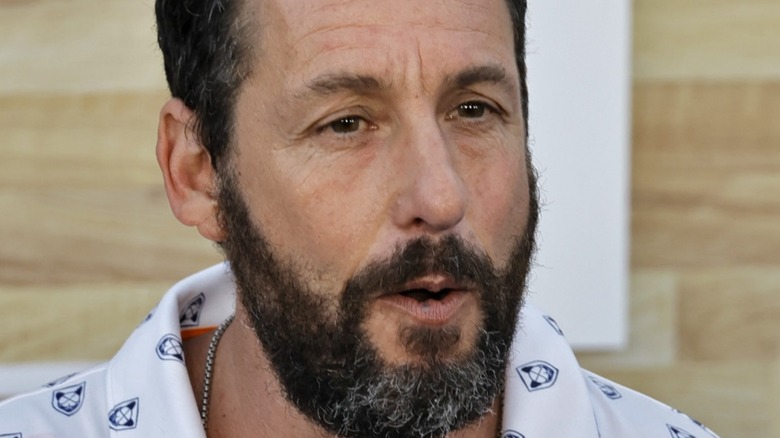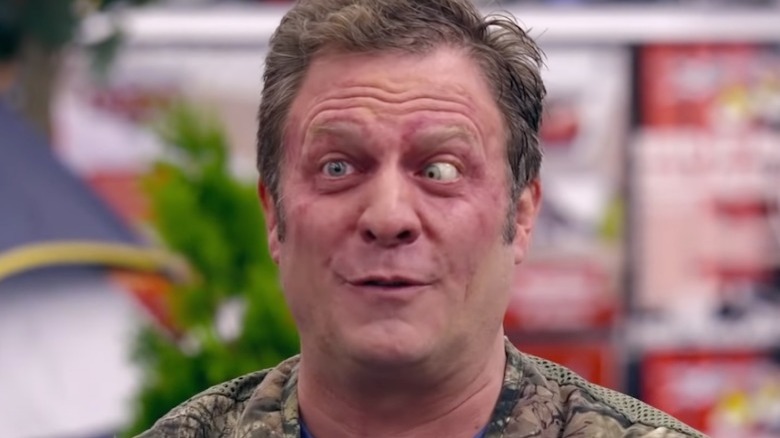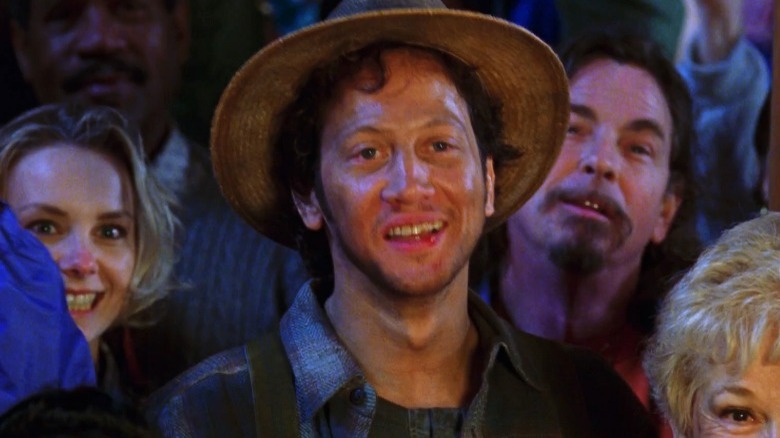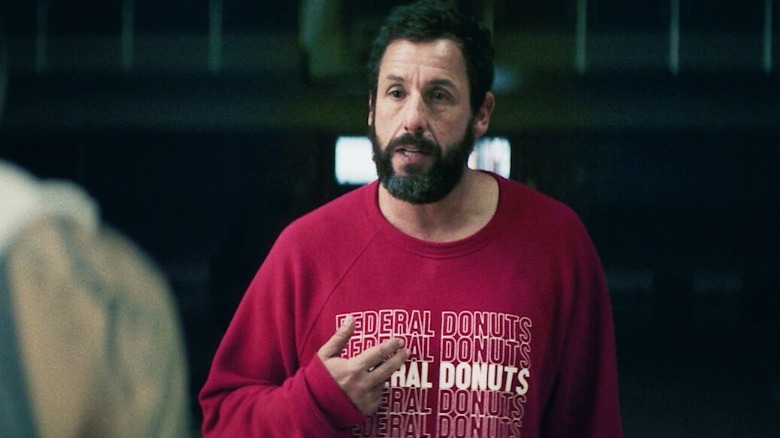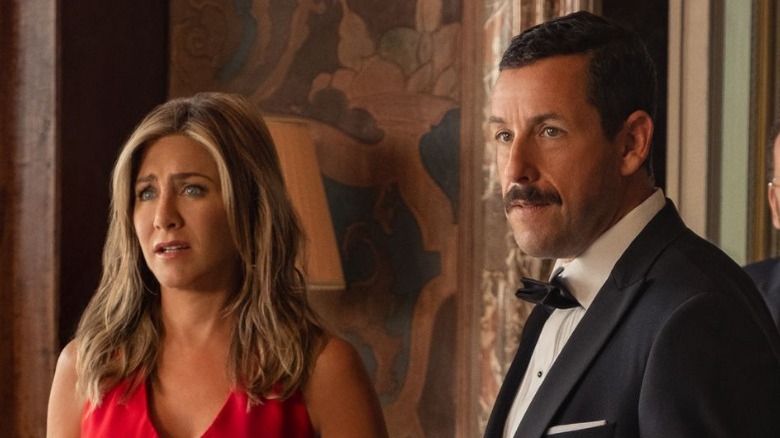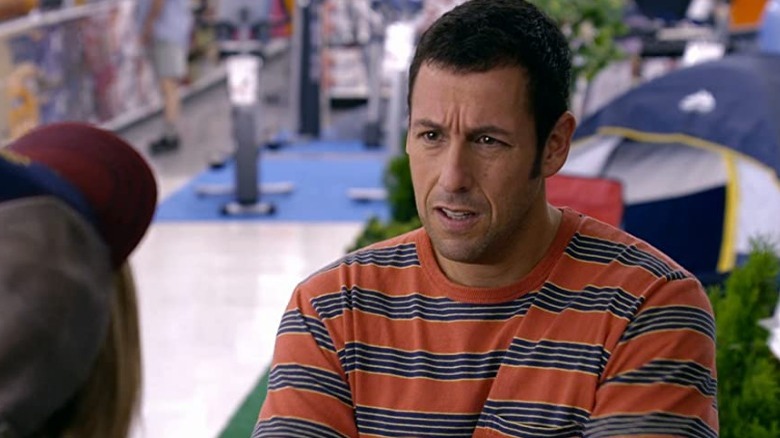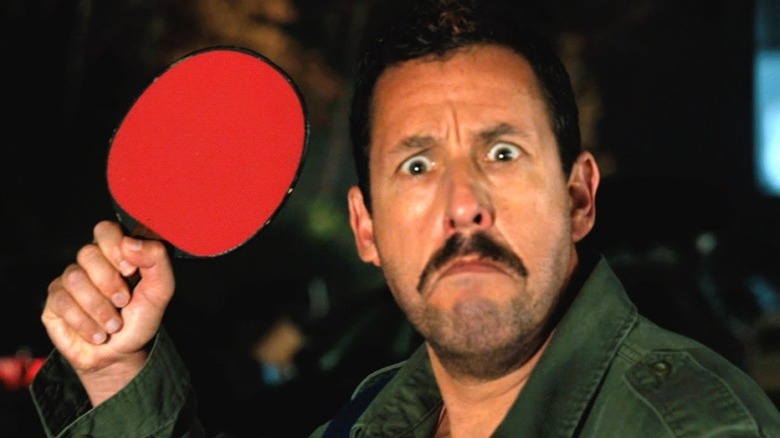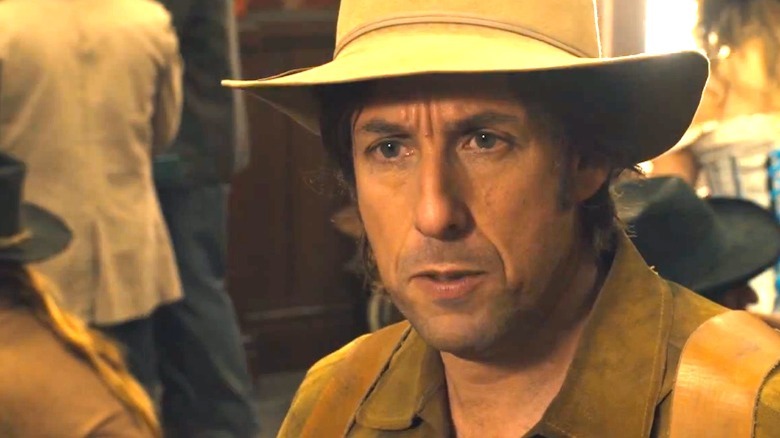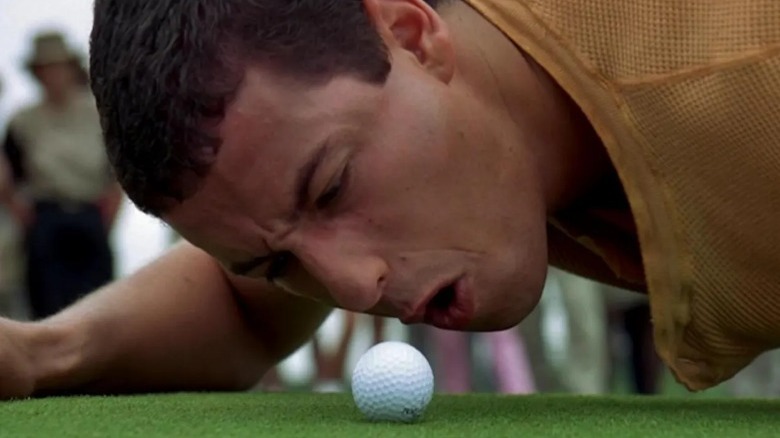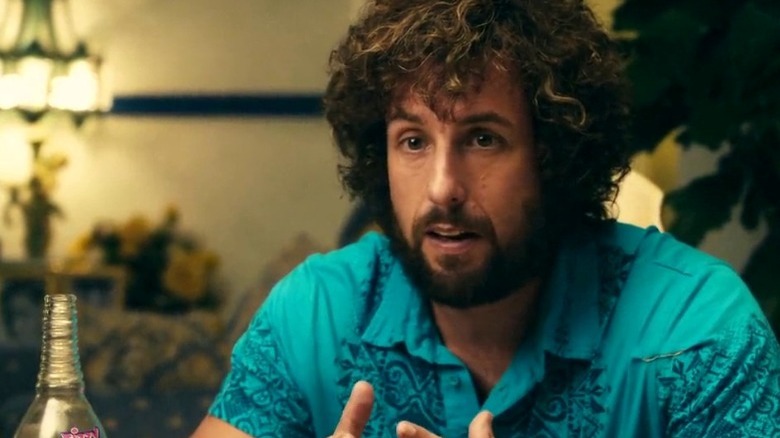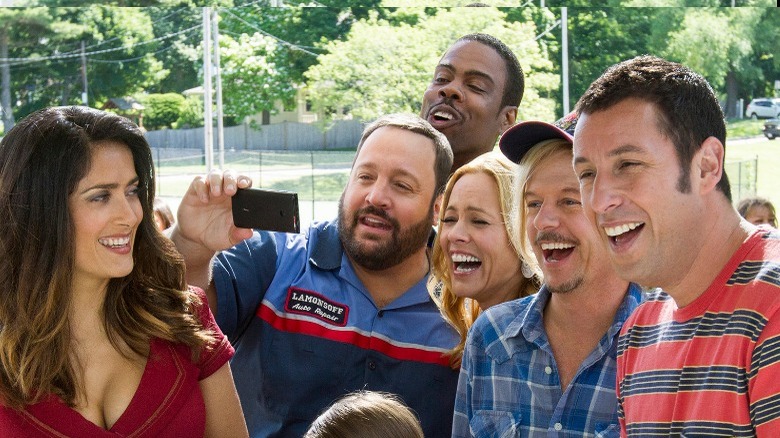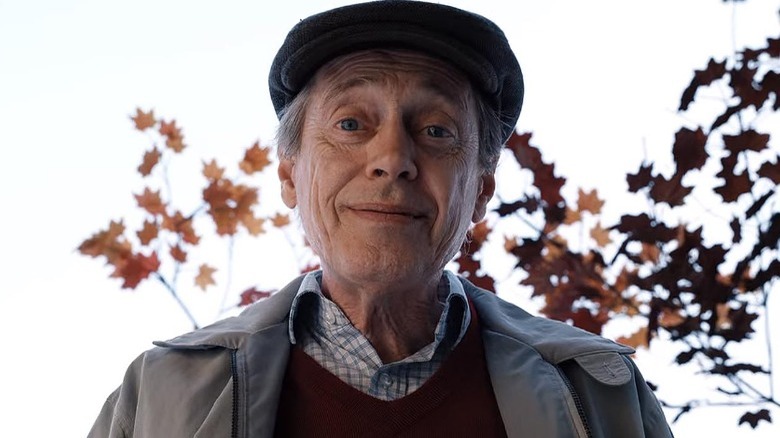Things People Can't Stand About Adam Sandler Movies
Adam Sandler has emerged as one of the most important figures in the world of comedy over the last three decades. From his breakout roles in "Happy Gilmore" and "Billy Madison" to his critically acclaimed performances in "Hustle" and "Uncut Gems," he has established himself as a huge star in Hollywood. Yet despite all of his success and popularity, Sandler has remained a divisive figure, and someone who splits opinion like almost no one else.
The actor has taken the lead role in dozens of movies and signed lucrative deals with Netflix, but is often criticized by the media and many movie fans turn their noses up at him. Even his very best movies still manage to attract derogatory comments and accusations of laziness and predictability.
It's not hard to see why Sandler's various starring vehicles garner such a reaction — almost all of them share certain elements that make them difficult to watch in one way or another. Even the most enthusiastic follower of the comedian will probably have an issue with some of these things that show up in every one of his films.
All of the endless cameos
If there's one thing that's for certain in an Adam Sandler movie, it's that you can expect to see lots of cameos. This is a sort of signature element of his movies, and he's had famous figures from all walks of life join him on screen since he first got his start in Hollywood. His early vehicles were defined in part by appearances from the likes of Bob Barker, Ben Stiller, and Chris Farley in "Happy Gilmore" and "Billy Madison," and famous friends popping up for one or two memorable scenes quickly became part of the Sandler formula.
While some of the cameos work out and actually add to the movies — as is the case with the aforementioned Barker and even John McEnroe or Ozzy Osbourne — many of them just seem out of place and unnecessary. It's almost as if Sandler is on some sort of crusade to include everyone he knows in his projects. This means you always see the same faces in his movies, whether it's Steve Buscemi, Chris Rock, Shaquille O'Neal, or Jonathan Loughran. In the vast majority of cases, it seems as if these famous faces are included for the sake of having cameos (and maybe just Sandler having a good time with his friends), rather than to benefit the overall movie.
Constantly seeing Rob Schneider
While Rob Schneider could be said to be a rising star of the comedy world during the late 1990s and early 2000s, things dipped for the actor quite quickly after that. An alumnus of "Saturday Night Live" from the same time that Sandler worked on the sketch institution, he soon began to appear in a variety of his films, including early cameo roles in "The Waterboy" and "Big Daddy." He later went on to kick off his own solo career with "Deuce Bigalow: Male Gigolo," but has largely fallen into obscurity in recent years, with the actor largely depending on a combination of personal controversies and his parts in Sandler movies to stay in the spotlight.
There are a lot of problems with Schneider being a constant presence in Sandler's films. As noted by Time, he is an avid anti-vaxxer who has spoken out about childhood vaccinations several times throughout his career. According to Vox, the comedian is also the worst-reviewed actor of all time based on an analysis of Metacritic data, giving you some sense of the public perception of his talents. Finally, there's his penchant for portraying characters who represent some sort of ethnic stereotype, whitewashing roles in offensive and lazy ways. As per Screen Crush, these have included playing an Asian priest in "I Now Pronounce You Chuck and Larry" and a Hawaiian man in "50 First Dates."
The fact that he can make good movies
Adam Sandler didn't get where he is by being incapable of making good movies. Netflix wouldn't keep extending his lucrative contract (via The Wrap) to keep him producing movies for the streaming giant if he was. Sure, he hasn't produced a lot of critical darlings, but his movies remain popular and, as The Numbers can show, his box office takings are now over $3 billion — which is even more impressive considering the vast majority of his films since 2014 have been exclusive to Netflix.
Viewers know that Sandler is more than capable of producing a good movie. Sure, there are a lot of near-universally hated films like "The Ridiculous 6," "Jack and Jill," and "The Cobbler" among his filmography, but he's also had sure-fire comedy hits in the form of "Happy Gilmore" and "Billy Madison" to his name. The actor also had starring roles in "The Wedding Singer" and "Punch-Drunk Love," two romantic comedies that garnered positive reviews from critics. These examples prove that Sander is more than able to produce funny movies that are worth watching, which makes his weaker films all the more disappointing.
They often just aren't that funny
Although we've shown that Sandler is actually capable of making crowd-pleasing comedy movies (at least in his earlier days), there's a growing mountain of evidence to suggest that he just might not be all that funny nowadays. A quick glance at his Rotten Tomatoes page shows that very few of his comedies have been well received. The Daily Beast described "Jack and Jill" as the "worst movie ever made," while Variety wrote that "The Ridiculous 6" had hardly any laughs throughout the entire movie. Meanwhile, in a review of "Grown Ups 2," Time Out Magazine said the best moment of the film came in the first five minutes, declaring, "It's all downhill from there."
This has led people like Jakob Barnes of The Digital Fix to plead with Sandler to give up on comedies and stick to more serious roles. "Why does Sandler insist on churning out rubbish year after year," Barnes asked, "when he's proven on multiple occasions that he's actually an incredible dramatic actor?" After all, most ofSandler's best performances have come in dramas and more serious work. Films such as "The Meyerowitz Stories" and "Uncut Gems" proved that Sandler does have some real acting ability and is capable of portraying a non-comic character with pathos and nuance. The comedian's summer 2022 release, the sports drama film "Hustle," has also been lauded by critics and is another example of why Sandler might be better off leaving his funny roles behind.
His films seem to be getting simpler and more basic
During his early career in the movie industry, Sandler couldn't fall back on tropes that he'd previously used because he had no library of films to borrow ideas from. But that's no longer the case, and it's clear he's been coasting on some very common elements in pretty much every film that he makes. His character will almost always be shown in a relationship with an incredibly beautiful woman. He'll work an easy job that requires little effort or he'll have no money issues so he can slack off. He'll portray a dim-witted, silly, and naïve character. Most specifically, the movie will probably feature some sort of elderly actor playing a peculiar or strange older companion to the protagonist.
It's no surprise that moviegoers usually find it difficult to find any depth or complexity in a Sandler movie. The plots of these films invariably fall into the same patterns, following a set formula that the comedian has honed over the years so that he can simply swap out characters and locations to come up with a new film. The Washington Post lambasted Sandler's output over the last two decades, writing, "With a few exceptions, his films have grown increasingly simplistic, their jokes ever cruder to the point of being cringe-inducing." Meanwhile, reviews for films such as "Grown Ups 2" note how there are seemingly no cohesive narrative or story elements in his more recent comedies, making for tired and predictable strings of gags.
Cringeworthy crude jokes
What humor there is in Sandler's movies can best be described as crude, cringeworthy, and puerile. There's nothing in the way of highbrow comedy in his average vehicle, with the jokes not requiring any real thought or intelligence to understand. According to Business Insider, this is a result of the way that the actor performed on "SNL" before he transitioned to movies, carrying over what had made him a success previously.
This is completely fine in moderation, but when an entire film is built on these types of gags it can quickly get boring — and considering just how much of Sandler's back catalog is based on such humor, the jokes have started to wear a bit thin. Even movies with clever premises can be sunk by this overreliance on one-note humor. For example, in a review of "Click" for the BBC in 2006, Paul Arendt wrote, "[A] potentially intriguing notion is utterly wasted on fart jokes, fat jokes, smack-on-the-head jokes, and soul-sucking sentimentality."
A report by The Washington Post notes how the vulgarity of Sandler's comedies has only increased over time, becoming grosser as the comedian has grown older and his target audience has gotten more mature (in certain senses of the word). Of course, there have also been plenty of lazy stereotypes that are not only humorless, but also highly offensive.
There's plenty of racism in his movies
While most of Sandler's humor is fairly innocent, even if it is crude, there have been times when he's been accused of propagating racist stereotypes. The best example of this is probably the 2015 Netflix production "The Ridiculous Six." According to the Indian Country Today Media Network, many of the Navajo Nation actors who were appearing in the movie walked off the set after what they stated were insults against the women and elders taking part. After their concerns were seemingly dismissed by producers, they left the production and spoke out against the movie for the way it misrepresented Apache culture.
It's not just "The Ridiculous Six" that's problematic, and part of the reason why many people simply can't watch Sandler's movies is that similar problems rear their head in a number of them. His films often contain everything from outlandish accents of foreign characters to anachronistic portrayals of people from different ethnic backgrounds and cultures. Salon notes that movies such as "Blended," "I Now Pronounce You Chuck and Larry," "Jack and Jill," and "Billy Madison" all contain offensive remarks and actions that could easily be seen as discriminatory. These range from exaggerated caricatures to examples of yellowface, something that simply is not appropriate and not at all funny.
The silly voices and angry yelling
Two particular things that you can be almost certain will happen in every Sandler movie: he will yell and shout as part of some loud angry outburst, and he'll speak in a grating silly voice. Having the protagonist be a screaming and indignant manchild who will become furious at the slightest provocation is sort of a trademark of the actor's comedy characters.
Just look at the scene in "Happy Gilmore" when Happy repeatedly loses his temper and even argues with a golf ball. As a compilation by YouTube user Owenergy shows, Sandler apparently loves to scream, and it's inevitably become dull over the years as audiences grow increasingly irritated by it, rather than finding it amusing.
On the other hand, Sandler has also demonstrated that he can perform a variety of different voices over the years. This may have something to do with his singing ability, which has been put to good effect in many of his movies — particularly "The Wedding Singer" — and gives him more control of the noises coming out of his mouth. Unfortunately, these silly voices are not something that are universally popular, and are actually off putting for a lot of viewers.
It can make movies like "Little Nicky" almost unwatchable, and the parts in films where he puts on a funny voice are usually some of the most uncomfortable moments. There's a good reason why children generally grow out of this kind of comedy as they get older — it simply isn't that funny, and soon gets tiresome for everyone around.
There's rarely any good acting
Let's get this out of the way straight away. Adam Sandler can act, and he has proven this multiple times over his career. His performances in his early movies, such as "Happy Gilmore" and "The Wedding Singer," show a comedian who can entertain and hold the audience's attention effectively. Meanwhile, his roles in dramatic movies where he's charged with taking on serious roles have earned him praise from critics, while Unilad reports that fans have called for the actor to stick to these types of parts in the future rather than comedy roles.
Despite his clear ability, most of his films feature very mediocre acting at best. For proof, one need look no further than the record 11 Razzie nominations received by Sandler's two 2011 projects, "Jack and Jill" and "Just Go With It" (via The Guardian). Sandler himself has also earned more than 10 nominations for Worst Actor by the Golden Raspberry Awards over the course of his career, showing just how poor many of his performances have been. This stretches from 1999's "The Waterboy" all the way up to "Hubie Halloween" in 2021. It isn't just Sandler that puts in awful acting either, with co-stars like Rob Schneider being nominated for Worst Supporting Actor at the Razzie Awards (via IMDb).
They make so much money
It's hard to reconcile the box office performance of Sandler's filmography with the critical reception each film has received. With Metacritic giving just seven out 67 movies a positive score, you might think that the actor should be considered a box office flop. However, that couldn't be further from the truth. Data from The Numbers reveals that only a very small number of his films have failed to make a profit, while the actor himself has a box office gross of more than $3 billion.
In more recent times, the vast majority of Sandler's movies have been exclusive to Netflix, meaning that they don't have traditional box office grosses to report like his earlier releases. That makes it difficult to determine exactly how financially successful they've been, but his Netflix projects have all received plenty of viewing hours from subscribers, and his original deal in 2014 was worth $250 million, according to IndieWire.
A report by We Got This Covered suggests that an extension could have made the overall agreement worth upwards of $500 million in total. That's an impressive number considering that only "Hustle" and his stand-up special "Adam Sandler: 100% Fresh" have received positive reviews, with the other films almost universally failing to break the 50% mark on Rotten Tomatoes' critic approval rating. Seeing how much money is raked in by so many of his terrible movies might well be infuriating for viewers.
He puts great actors in terrible roles
As mentioned earlier, Sandler likes to include famous faces in his movies and, although many of them are cameos, others take on more significant roles. In fact, Sandler has included some of the biggest and brightest names in Hollywood in his films over the years. There was Al Pacino in "Jack and Jill," Jack Nicholson in "Anger Management," Salma Hayek in "Grown Ups" and its sequel, and Christopher Walken in "Click." Meanwhile, Steve Buscemi is a mainstay of Sandler's releases, with the two appearing in some 16 movies together since they first met filming 1994's "Airheads."
Just those aforementioned five actors alone have amassed numerous awards during their careers in recognition of their performances, with Primetime Emmys, Golden Globe Awards, Screen Actors Guild Awards, Tony Awards, and more than 20 Oscar nominations among them. With such a good pedigree, you'd think that Sandler would want to make good use of their acting talents and put them to good use in his films — after all, few comedy films manage to attract such critically acclaimed actors for major roles. Unfortunately, that hasn't been the case. The roles have been wasted on mostly terrible movies and parts that are not deserving of such great actors.
